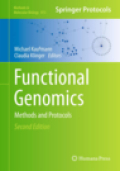
Over the last decade Life Science has undergone an accelerated evolution, culminating in the -omics era characterized by the development of a multitude of high throughput methods that are becoming more routinely applied in biochemistry labs. In Functional Genomics: Methods and Protocols, Second Edition expert researchers in the field detail many of the methods which are now commonly used for studies in the life sciences focusing on the dynamic aspects of the transcriptome, proteome and metabolome, respectively.Written in the highly successful Methods in Molecular Biology™ series format, chapters include introductions to their respective topics, lists of the necessary materials and reagents, step-by-step, readily reproducible laboratory protocols, and key tips on troubleshooting and avoiding known pitfalls. Authoritative and practical, FunctionalGenomics: Methods and Protocols , Second Edition seeks to aid scientists in establishing or extending technologies and techniques in their laboratories. Useful for all scientists who plan to establish or extend one of the technologies described in the book in their own labs. Provides step-by-step detail essential for reproducible results. Contains key notes and implementation advice from the experts. INDICE: Prediction of Protein Tertiary Structures using MUFOLD.-Predictionof Protein Functions.-Genome Wide Screens for Expressed Hypothetical Proteins.-Self Custom-Made SFP Arrays for Non-Model Organisms.-Construction and Analysis of Full-length and Normalized cDNA Libraries from Citrus.-Assembling LinearDNA Templates for in vitro Transcription and Translation.-Automated Computational Analysis of Genome-wide DNA Methylation Profiling Data from HELP-taggingAssays.-Detection of RNA Editing Events in Human Cells using High- Throughput Sequencing.-Comparative Study of Differential Gene Expression in Closely Related Bacterial Species by Comparative Hybridization.-Whole Genome RT-qPCR MicroRNA Expression Profiling.-Using Quantitative Real-Time Reverse Transcriptase Polymerase Chain Reaction to Validate Gene Regulation by PTTG.-FRET-Based Real-Time DNA Microarrays.- 2-D Gel Electrophoresis: Constructing 2D-Gel Proteome Reference Maps.-The use of Antigen Microarrays in Antibody Profiling.-Limited Proteolysis in Proteomics using Protease-immobilized Microreactors.-Mass Spectrometry for Protein Quantification in Biomarker Discovery.-High-throughput Microtitre Plate-based Assay for DNA Topoisomerases.-Microscale Thermophoresis as a Sensitive Method to Quantify Protein - Nucleic Acid Interactions in Solution.-Bioluminescence Resonance Energy Transfer: an Emerging Tool for the Detection of Protein-protein Interaction in Living Cells.-LuMPIS – Luciferase-basedMBP-pull-down Protein Interaction Screening System.-Yeast Two-Hybrid Screens:Improvement of Array-based Screening Results by N- and C-terminally Tagged Fusion Proteins.-Inducible microRNA-mediated Knockdown of the Endogenous Human Lamin A/C Gene.- Multiple-gene Silencing using Antisense RNAs in Escherichia coli. Functional Screen of Zebrafish Deubiquitylating Enzymes by Morpholino Knockdown and in situ Hybridization.-Silencing of Gene Expression by Gymnotic Delivery of Antisense Oligonucleotides.-Polycistronic Expression of Interfering RNAs from RNA Polymerase III Promoters.-Metabolite Analysis of Cannabis sativa L. by NMR Spectroscopy.-Metabolome Analysis of Gram-positive Bacteria such as Staphylococcus aureus by GC-MS and LC-MS.-Metabolic Fingerprinting Using Comprehensive Two-dimensional Gas Chromatography – Time-of-flight Mass Spectrometry (GC×GC-TOF-MS).
- ISBN: 978-1-61779-423-0
- Editorial: Humana Press
- Encuadernacion: Cartoné
- Páginas: 437
- Fecha Publicación: 28/12/2011
- Nº Volúmenes: 1
- Idioma: Inglés
